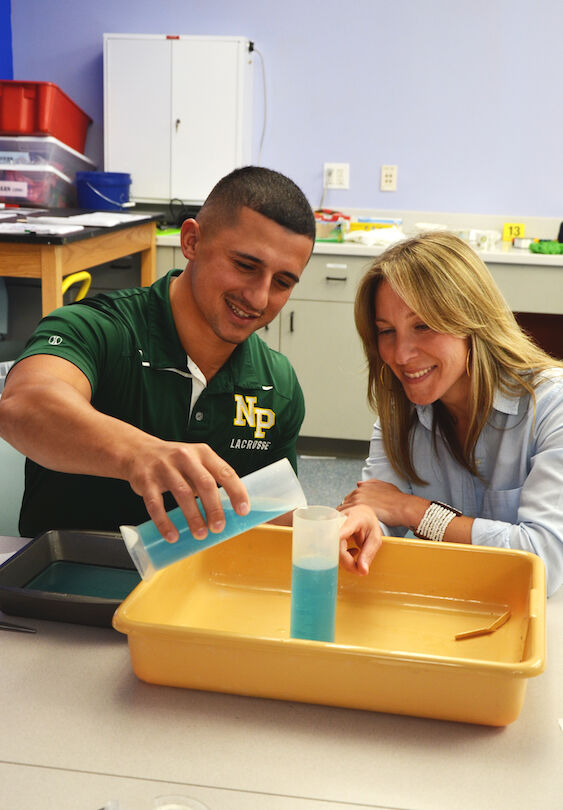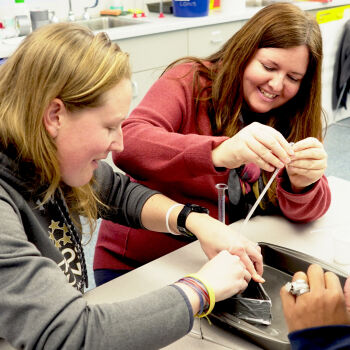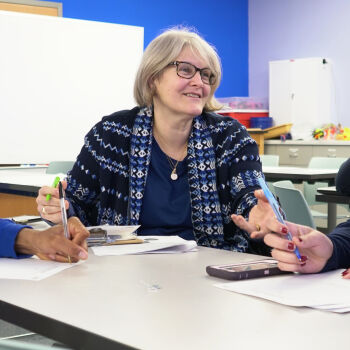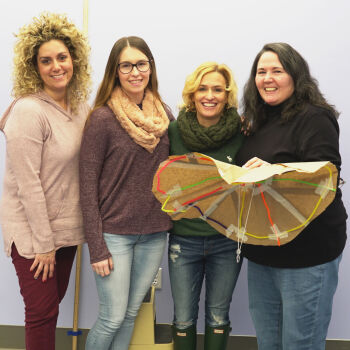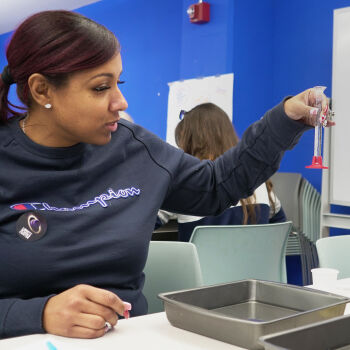Group Workshops
Interested in professional development for your teachers? Our Group Workshops can be customized in content emphases, grade level, and length (one day through multi-day) to complement your group's needs and schedule.
Group Workshops can even be combined with student programs like Electronic Field Trips or Laboratory Workshops.
To make a reservation or for more information, call 201.253.1310 or email us at groups@lsc.org.
Learn about our different Group Workshops below:
Deep Dive Into the NGSS Workshops
These workshops offer comprehensive training for teachers in unpacking the Next Generation Science Standards, also known as the New Jersey Student Learning Standards for Science and New York State Science Learning Standards. Participants experience and reflect upon the standards-based shifts for classroom instruction.
NGSS Overview: Teaching Science in Three Dimensions
This workshop introduces the Next Generation Science Standards, highlighting key shifts in content and practices that the new standards bring to classrooms. Educators will become familiar with teaching through the three dimensions of NGSS: Disciplinary Core Ideas, Science and Engineering Practices, and Crosscutting Concepts. Participate in hands-on activities that illustrate how the standards support inquiry. Discuss and revise activities to effectively support the standards and meet performance expectations.
Teaching Science with Crosscutting Concepts
Elevate your teaching practice during this interactive workshop focusing on the key third dimension of the NGSS. Explore and discuss the crosscutting concepts through several hands-on activities, including investigations and card sorts. Modify your existing lessons to incorporate relevant crosscutting concepts.
Phenomena-Based Classrooms
Explore NGSS (NJSLS-S) phenomena, which are designed to motivate students to figure out why something happens in order to build three-dimensional understanding. We will explore phenomena rooted in compelling real-world situations, including hands-on investigations and local exploration.
Asking Questions and Planning Investigations
This workshop focuses on two science and engineering practices: Asking Questions and Planning and Carrying Out Investigations. Engage in different questioning protocols and participate in investigations that highlight the synergy of these two practices. Reflect on the inquiry-based science investigations in order to modify existing science lessons.
Analyzing and Interpreting Data
Investigate ideas through the science practice of Analyzing and Interpreting Data as well as the crosscutting concept of Patterns. Engage in hands-on activities and carry out investigations that highlight the importance of qualitative and quantitative data in science learning. Reflect on these investigations to plan modifications of current science lessons.
Developing and Using Models
Explore the practice of Developing and Using Models as well as the crosscutting concepts of Systems and System Models and Scale, Proportion, and Quantity. Deepen understanding of these two dimensions and participate in engaging science activities. Reflect upon the workshop sample investigations and modify existing science lessons in order to strengthen their support of the NGSS’s performance expectations.
Evidence-Based Explanations and Argumentation
Focus on two high-leverage Science Practices: Constructing Explanations and Engaging in Argument from Evidence. Conduct investigations that require collecting data and other evidence that will form the foundation for constructing explanations and engaging in evidence-based science argumentation. Based on this learning, modify existing science lessons to be better aligned to the NGSS.
Research Simulation Tasks (Grades 6 - 12)
Engage in research simulation tasks that integrate nonfiction text, data sets, videos, and scientific investigations. Develop strategies for supporting student success with these extended writing tasks. You must bring a laptop with WiFi connection capabilities to this workshop.
Integrating the NGSS with Common Core ELA and Math Standards
Explore learning synergies between the NGSS, the Common Core ELA, and Common Core Math Standards. Engage in hands-on, student-centered investigations which illustrate Using Mathematics and Computational Thinking; Engaging in Argument from Evidence; and Obtaining, Evaluating, and Communicating Information. Gain mastery in modifying existing science lessons to emphasize connections between these disciplines.
Problem-Based Learning through the NGSS Engineering Practices
Build capacity to bring the NGSS Engineering Practices into the science classroom. Participate in engineering challenges that use the Engineering Practices to solve real-world problems. Reflect on best practices in student-friendly engineering challenges and subsequently modify units to integrate these practices.
Unpacking the NGSS: Planning 3-Dimensional STEM Lesson Elements
As you implement the new standards, LSC can partner with you to evaluate and adapt your curricular models, lesson design, and pedagogy to capitalize on your current strengths and incorporate NGSS requirements, including the New Jersey and New York science standards. This course can be customized in content emphasis, grade level bands (K - 2, 3 - 5, 6 - 8, or 9 - 12) and length (one day or multi-day) to complement your district’s needs and schedule.
Inquiry-Based Learning Workshops
These workshops have a particular emphasis on educators participating in inquiry-based lessons and activities. Teachers will experience the effectiveness of inquiry as the basis of student learning while learning strategies that will increase inquiry activities in their classrooms.
Inquiry-Based Learning in STEM and Humanities (Grades K - 12)
Deepen your understanding of how inquiry-based learning looks in STEM and humanities classrooms. Dive into sample hands-on inquiry lessons that connect across disciplines. This workshop is co-facilitated by a teacher with expertise in STEM inquiry and a colleague experienced in utilizing inquiry in the humanities.
Investigating Climate Change & Human Impact on Ecosystems (Grades 6 - 12)
Engage in critical science and engineering practices (e.g., developing and using models, asking questions) while building content knowledge to support teaching climate change and human impact on ecosystems. Explore and discuss how to effectively structure inquiry while using science practices to build understanding of the disciplinary core ideas.
Relationships in Ecosystems: Plants, Insects & Birds (Grades 3 - 8)
Model and analyze the relationships that are critical to healthy ecosystems. Discuss and evaluate ecosystem-based lessons that are relevant to student interests and experiences. Weather permitting, participate in brief citizen science activity outside.
It’s All in the Question (Grades K - 12)
Effective hands-on science instruction encourages students to make observations, manipulate data, construct explanations, and design solutions. Learn how to stimulate student thinking by helping them ask their own questions, make predictions, plan and carry out investigations, and respond to open-ended questions.
Citizen Science in the Classroom (Grades 3 - 12)
From BioBlitzes to backyard mapping to galaxy discovery, explore how your classroom can benefit from citizen science projects. With a focus on the Science Practices of Analyzing and Interpreting Data and Using Mathematics and Computational Thinking, reflect on how to develop a citizen science project that aligns with NGSS, promotes student collaboration, and engages students with solving real-world problems through scientific research.
The Power of Mapping Data (Grades 6 - 12)
Amaze your students with the power of mapping and manipulating data. Investigate online mapping technology Geographic Information Systems (GIS), which promotes visualization and manipulation of spatial data. Infinitely adaptable to exploring different science content areas, online GIS promotes digital literacy and critical thinking skills. With a focus on the Crosscutting Concept of Scale, Proportion, and Quantity and the Science Practices of Asking Questions and Analyzing and Interpreting Data, you will reflect on innovative ways to bring mapping and data analysis to your classroom.
Technology & Engineering Workshops
These workshops will engage educators in lessons that encourage learners to build their problem-solving skills in the domains of technology and engineering. Teachers will learn effective strategies for increasing their students' technological literacy and engaging more deeply in the NGSS engineering practices.
Computational Thinking for STEM Educators (Grades K - 12)
Explore the major competencies in computational thinking (i.e., pattern recognition, decomposition, abstraction, and algorithms), experience hands-on STEM activities that support those domains, and purposefully incorporate computational thinking into existing lessons.
Introduction to Block Coding for STEM Educators (Grades K - 12)
Never coded? Never fear! All levels of experience are welcome. Come program for the first time or expand your skills if you’ve coded with block-based languages before. Explore the foundations of coding on either Scratch or Code.org, evaluate coding projects, and learn how to integrate offline activities which support computer science and STEM learning. You must bring a laptop with WiFi connection capabilities to this workshop.
Engineering is Elementary (Grades K - 5)
This research-based elementary engineering curriculum has proven engaging and effective in involving students in STEM units that focus on the Engineering Practices. During this workshop, you will explore a sample curriculum unit and be exposed to many other topics that will engage both teachers and students in pursuing proficiency in the NGSS-based Engineering Practices.
Design Thinking for STEM Educators (Grades K - 12)
Learn how to unite science investigations, engineering, and design thinking as you explore how to develop students’ creativity, communication, and problem-solving skills. Engage in hands-on design challenges and discuss how to leverage design thinking to support national standards and 21st century skills.
Introduction to 3D Printing for Educators (Grades K - 12)
Explore the power and joy of 3D printing for your classroom! Learn the basics of 3D printing, create your own design in Tinkercad, and discuss different classroom-based examples of 3D printers in education.
